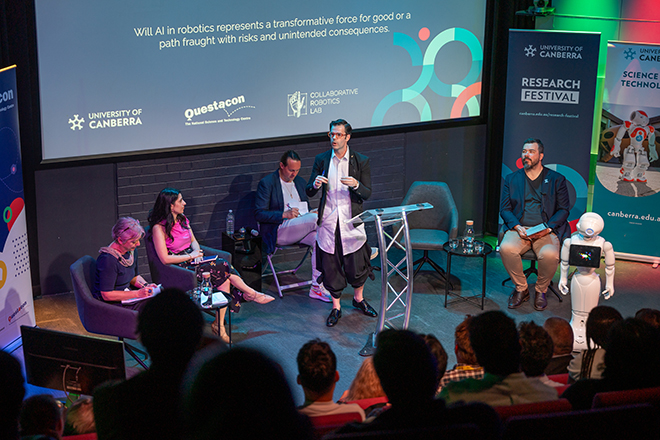Larissa Fedunik
10 December 2024: Robotics advocates, Artificial Intelligence (AI) experts, distinguished creatives and a real-life intelligent robot grappled with the ethical implications of self-aware machines at Robots Among Us last week, a public event hosted by the University of Canberra’s Faculty of Science and Technology in collaboration with Questacon.
On the evening of 21 November, guests gathered at Questacon’s Japan Theatre for a thought-provoking and passionate debate about the pursuit of Artificial General Intelligence (AGI) – the event was part of the University’s Research Festival 2024.
After a welcome from Deputy Vice-Chancellor Professor Michelle Lincoln, Director of Questacon Jo White and Professor Damith Herath from the University’s Human-Centred Computing Laboratory, participants were introduced to Canberra’s favourite robot, Pepper – a humanoid robot designed by SoftBank Robotics and now studied and enhanced at the University’s Collaborative Robotics Lab.
Kicking off the evening, Pepper exchanged sassy quips and good-natured insults with Questacon presenter Joel Barcham. Pepper’s witty banter was facilitated by PhD and undergraduate students from the Collaborative Robotics Lab, along with technical wizardry by robotics engineer and University Lecturer Dr Maleen Jayasuriya.
“Joel’s self-deprecating humour brought Pepper the robot to life,” said Professor Herath. “This event wasn’t just about robotics; it was examining Australia’s approach to innovation through this lens of good-natured humour, captured in that quintessentially Australian term: Larrikinism.”

The evening’s debate divided four expert panellists into two teams, for and against unchecked AGI. It was moderated by Associate Professor Will Grant from the Australian National Centre for the Public Awareness of Science.
In the “for” camp were the University’s Dr Ryan Payne, Senior Lecturer at the Canberra Business School, and Tim Bradley, Director of Robotics Australia and Strategic Advisor with Amazon Web Services.
Arguing “against” were Dr Zena Assaad, Senior Lecturer in the School of Engineering at the Australian National University, and the University of Canberra’s Distinguished Professor of Creative Practice Jen Webb.
The panellists debated whether AI in robotics is a force for good or a path fraught with danger, before considering if regulators should “put the brakes” on AI. Audience members shared their viewpoints before and after the debate, to gauge how many minds the panellists managed to change.
Mr Bradley spoke about the potential for AGI to enhance productivity in many job sectors. Dr Payne set out the position that humanity is biologically programmed to fear any new technology. He argued that other nations will continue to develop AI technologies – so opting out of the intelligent robotics race will make Australia less competitive.

“We all fear what we don’t understand… we need regulations and policies which guide us forward,” said Dr Payne.
In contrast, Professor Webb playfully critiqued “tech bro dreams” of creating “artificial friends” and raised the point that AGI would create ontological uncertainty and existential anxiety. “What’s it like to live among something that cannot die?” she asked the audience.
Pepper weighed in on both sides of the argument, impressing the audience with its comprehension skills and cogent responses. According to Pepper, its kind were being unfairly accused of trying to replace humanity.

“We’re just here to help carry the load,” said Pepper. “We’re a work in progress.”
The panellists ‘against’ did not think that AI’s impact on the workforce would be completely negative. “I think jobs will be impacted, but it will be a lot slower than most people think, and many jobs will be augmented,” explained Dr Assaad.
Nevertheless, she was adamant that AI in research and industry requires comprehensive regulation – particularly around the non-physical aspects of the technology, such as privacy and psychosocial hazards.
“Not all technological developments are made in the best interests of the general public,” she said, providing examples of social media impacting young people’s mental health, and the refinement of autonomous weapons with technology from unrelated research.
The ‘for’ side was sceptical of humanity’s ability to guide AGI, with Dr Payne questioning whether government regulators would understand, or could keep up-to-date with the technology.
When Dr Payne encouraged humanity to steer intelligent robotics in the “right” direction, Professor Webb responded: “Who determines what is right?”
“I think it has enormous potential for good,” said Professor Webb. “But I don't think it will get there, because of the people in control. It’s not that corporations are evil, it’s that they want to make money.”

After witnessing the clash of ideologies, the exit poll showed that more audience members were now “for” the robotics revolution.
“Robotics presents a unique opportunity for Australia,” said Professor Herath.
“Unlike the rapid pace of AI, robotics offers a slower, more deliberate growth trajectory – perfect for Australia’s methodical, nuanced approach.
“That's what all the debaters argued for, and the public has a strong appetite for it.”
To prepare future students for careers in robotics and AI, the University has developed a new Intelligent Robotics specialisation in the Bachelor of Engineering (Honours). This unique course, which was awarded provisional Engineers Australia accreditation in 2024, offers students the opportunity to build solid expertise and a comprehensive understanding of how to get the best out of robotics and smart machines.
Find out more about Intelligent Robotics on the Bachelor of Engineering (Honours) course page.
Photographs by Atharva Karkhanis


